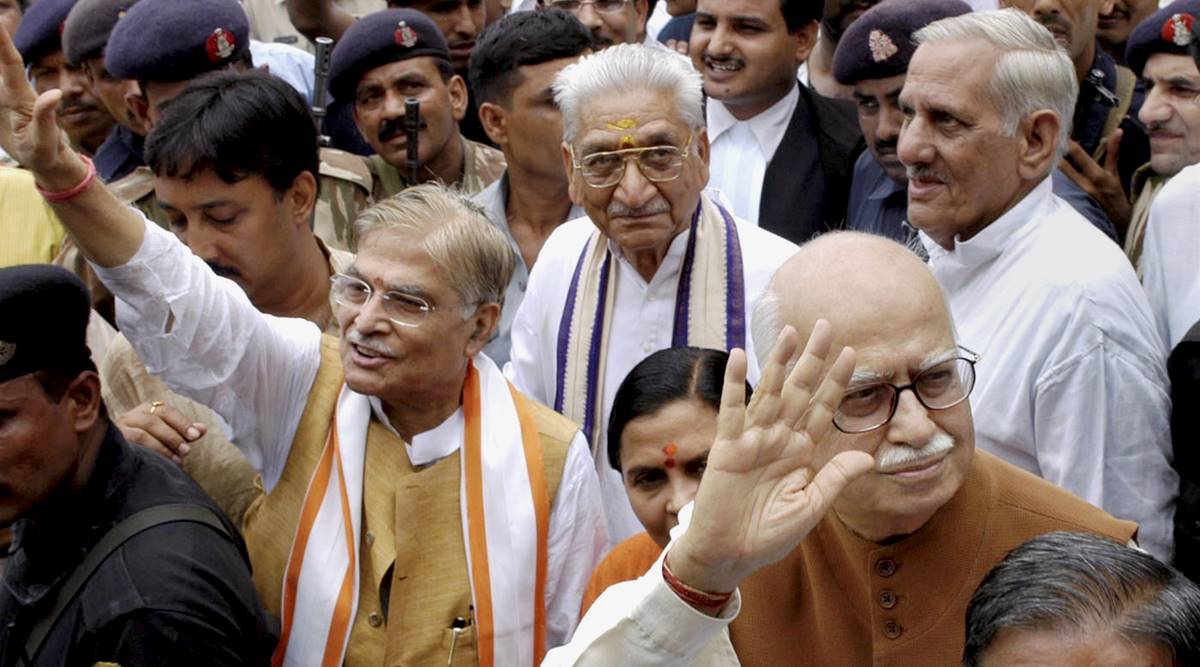 In this file photo, dated July 2005, is seen senior BJP leaders LK Advani, MM Joshi and Uma Bharti in Raebareli. Advani, Joshi and Bharti, accused in Babri mosque demolition case, have been acquitted by the special CBI court after the pronouncement of its judgment in the case, on Wednesday. (PTI)
In this file photo, dated July 2005, is seen senior BJP leaders LK Advani, MM Joshi and Uma Bharti in Raebareli. Advani, Joshi and Bharti, accused in Babri mosque demolition case, have been acquitted by the special CBI court after the pronouncement of its judgment in the case, on Wednesday. (PTI)Rejecting Pakistan’s criticism of the acquittal of all the 32 accused in the Babri Masjid demolition case, the Ministry of External Affairs said that it might be difficult for the neighbouring country, which has a “coercive apparatus”, to understand the ethos of democracy and rule of law.
“India is a mature democracy where the government and people abide by the verdicts of the court and show respect for the rule of law,” External Affairs Ministry Spokesperson Anurag Srivastava said at an online media briefing.
“It may be difficult for a system with a coercive apparatus where people and the courts can be silenced at will of the establishment to understand such a democratic ethos,” he said.
Reacting to Wednesday’s judgment, the Pakistan Foreign Office reportedly condemned what it called “shameful acquittal” of those responsible for the demolition of a historic mosque. “Pakistan urges the Indian government to ensure safety, security and protection of minorities, particularly Muslims and their places of worship,” PTI quoted the Pakistan Foreign Ministry as saying.
“Taking almost three decades to decide on the criminal act which was televised live and happened as a result of well-planned Rath Yatras and on the instigation to mobs by the accused BJP, VHP and other leaders of Sangh Parivar, tells the world that the Hindutva-inspired Indian judiciary miserably failed to deliver justice again,” Dawn quoted a statement by the Ministry of Foreign Affairs.
Almost 28 years after the demolition of the masjid, a special CBI court on Wednesday acquitted all the 32 accused, including BJP leaders Lal Krishna Advani, Murli Manohar Joshi, Kalyan Singh, Uma Bharti, in the criminal conspiracy case, holding that there was no conclusive proof against them. The order said there was no evidence that the accused had met “inside a room” to plan the razing of the mosque.
In his 2,300-page order, CBI Special Judge Surendra Kumar Yadav rejected evidence from photos, videos, and speeches of the accused, raised questions on the conclusions drawn by the prosecution, and referred to the possible involvement of Pakistani intelligence agencies and anti-social elements and terrorists disguised as kar sevaks who had entered the site.
The court said the CBI’s case on criminal conspiracy was weakened in the light of a report submitted on December 5, 1992 by the local intelligence unit (LIU), which said members of the Pakistani intelligence agency could infiltrate the venue and demolish the structure on December 6.
“According to one report, explosives originating from Pakistan have reached Ayodhya via Delhi… Another intelligence report says that about 100 persons including anti-social/anti-national elements from the Udhampur area of J&K are coming to Ayodhya in the garb of kar sevaks,” the court said, citing excerpts of the intelligence inputs.
📣 The Indian Express is now on Telegram. Click here to join our channel (@indianexpress) and stay updated with the latest headlines
For all the latest India News, download Indian Express App.